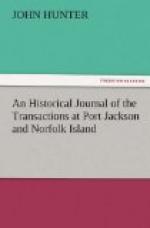For three successive days both Mr. Bradley and myself had a variety of distances, by which our account seemed to be very correct. I now determined (if I could avoid it) never to get to the northward of latitude 40 deg. 00’ south, and to keep between that parallel and 43 deg. or 44 deg. south. After the 3d, I found, by altitudes taken for the watch, that we went farther to the eastward than the log gave us, and no opportunity offered for getting a lunar observation to compare with it until the 13th, when both Mr. Bradley and I got several good distances of the sun and moon, by which our longitude was 70 deg. 22’ east, by the watch 70 deg. 07’ east, and by account 67 deg. 37’ east.
On the 14th, the weather being very clear, we had another set of distances, which gave our longitude 73 deg. 06’ east, by the watch 73 deg. 09’ east, and by account 70 deg. 34’ east. Again, on the 15th, I observed with two different instruments, one by Ramsden, and the other by Dolland, and the results agreed within ten miles of longitude; the mean was 75 deg. 18’ east, by the watch 75 deg. 16’ east, and by account 72 deg. 49’ east. Mr. Bradley’s mean was also 75 deg. 18’ east; so that, as I have already observed, the ship seemed gaining on the account; but there was no reason to believe, that in the middle of this very extensive ocean we were ever subject to much current: I therefore attribute this set to the eastward, to the large following sea, which constantly attended us, since we had taken a more southerly parallel. The variation of the compass continued to increase pretty fast, until we were as far to the eastward as 39 deg. 00’ east, where we found it 31 deg. 00’ west; from that longitude to 54 deg. 30’ east, it increased very slowly to 32 deg. 00’ west, which was the highest we had; during all that time we were in the parallels of 40 deg. 00’ and 41 deg. 00’ south.
We saw many whales, of a very large size, during this part of our passage, but very few birds. On the 16th, we saw a quantity of sea weed, which I suppose might have come from the island of Saint Paul, as we were now near its meridian, and not more than 60 leagues from it. We had at present every prospect of an excellent passage to Van Diemen’s Land: for although the wind sometimes shifted to the north-east, it seldom continued more than a few hours; then backed round again to north-west and south-west, between which quarters it seemed to blow as a trade wind; from north-north-east to the westward, and round to south-south-west are in general its limits: we had frequently hazy weather, but not so thick as to be called foggy; the wind in general very fresh.




